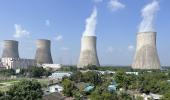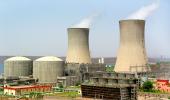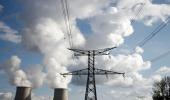AERB's permission for RAPP-7 paves the way for the subsequent phases of reactor commissioning leading to its commercial electricity generation.

India's nuclear regulator, the Atomic Energy Regulatory Board (AERB), has given its nod for initiation of controlled nuclear fission reaction in the Rajasthan Atomic Power Project (RAPP) Unit 7.
According to theb AERB, the permission for commencing nuclear fission was given after a satisfactory outcome of necessary safety reviews.
"AERB's permission follows an extensive regulatory oversight process ensuring compliance to all relevant safety and regulatory requirements through systemic and structured safety reviews complemented with regulatory inspections," says AERB Chairman D K Shukla.
"AERB's resident site observer team at the site will continue to monitor the commissioning activities," Shukla added.
The AERB permission issued is for addition of heavy water to the moderator system and initiation of a controlled nuclear fission reaction, technically termed as First Approach to Criticality and subsequent conduct of low power physics experiments.
The permission is granted after a comprehensive safety review of the reactor's design, construction and operational preparedness followed by deliberations by the AERB board.
The green signal was given on September 9, 2024, AERB added.

RAPP-7 is located in the Rawatbhata district of Rajasthan and is the third unit of the indigenously designed and built 700 MW Pressurised Heavy Water Reactor (PHWR).
The other two units of the same design are the Kakrapar Atomic Power Project (KAPP) units 3 and 4 located in Gujarat, which are currently operational.
AERB's permission for RAPP-7 paves the way for the subsequent phases of reactor commissioning leading to its commercial electricity generation.
Nuclear fuel began to be loaded into the reactor on August 1, 2024.
Nuclear Power Corporation of India Ltd (NPCIL), India's atomic power plant operator, said commercial production of power by Unit 7 will happen this year.
The atomic power major also said the other 700 MW plant (Unit 8) is expected to come on line next year.
RAPP 7 is the part of the 16 PHWRs with 700 MW capacity being built in the country.
In July, the 220 MW Unit 3 at the Rajasthan Atomic Power Station was connected to the grid after undergoing major renovation and modernisation -- replacement of coolant channel, feeder and other upgrades.
Unit 3 or RAPS 3 has now enhanced safety measures and 30 years of extended life, NPCIL said.
Commercial power generation began at RAPS 3 in June 2000 and was in operation for 22 years when it was taken up for renovation and modernisation in 2022.
The other nuclear fuel related development is the starting of making fuel for the 1,000 MW Units 3 and 4 being built at Kudankulam in Tamil Nadu by the Russian company TVEL Fuel Company.
According to Russia's integrated nuclear power major Rosatom, the fuel supply contract with India embraces the entire lifetime of the VVER-1000 model power units from the starting loading of the reactor cores.
Already two 1,000 MW plants -- Units 1 and 2 -- are functioning at Kudankulam. During the operation of the two units, Russian and Indian specialists have accomplished a large amount of work to improve their efficiency by introducing advanced nuclear fuel and extended fuel cycles.
Since 2022, Kudankulam nuclear power plants have been supplied with nuclear fuel of improved design TVS-2M.
That apart, in March this year, India entered the second phase of the three stage nuclear power programme with the 'core loading' at the first indigenous 500 MW Prototype Fast Breeder Reactor (PFBR) set up in Kalpakkam near Chennai.
The core loading process includes fuel loading.
The 500 MW PFBR is built by the fast breeder reactor company Bharatiya Nabhikiya Vidyut Nigam Ltd.
Venkatachari Jagannathan can be reached at venkatacharijagannathan@gmail.com










 © 2025
© 2025